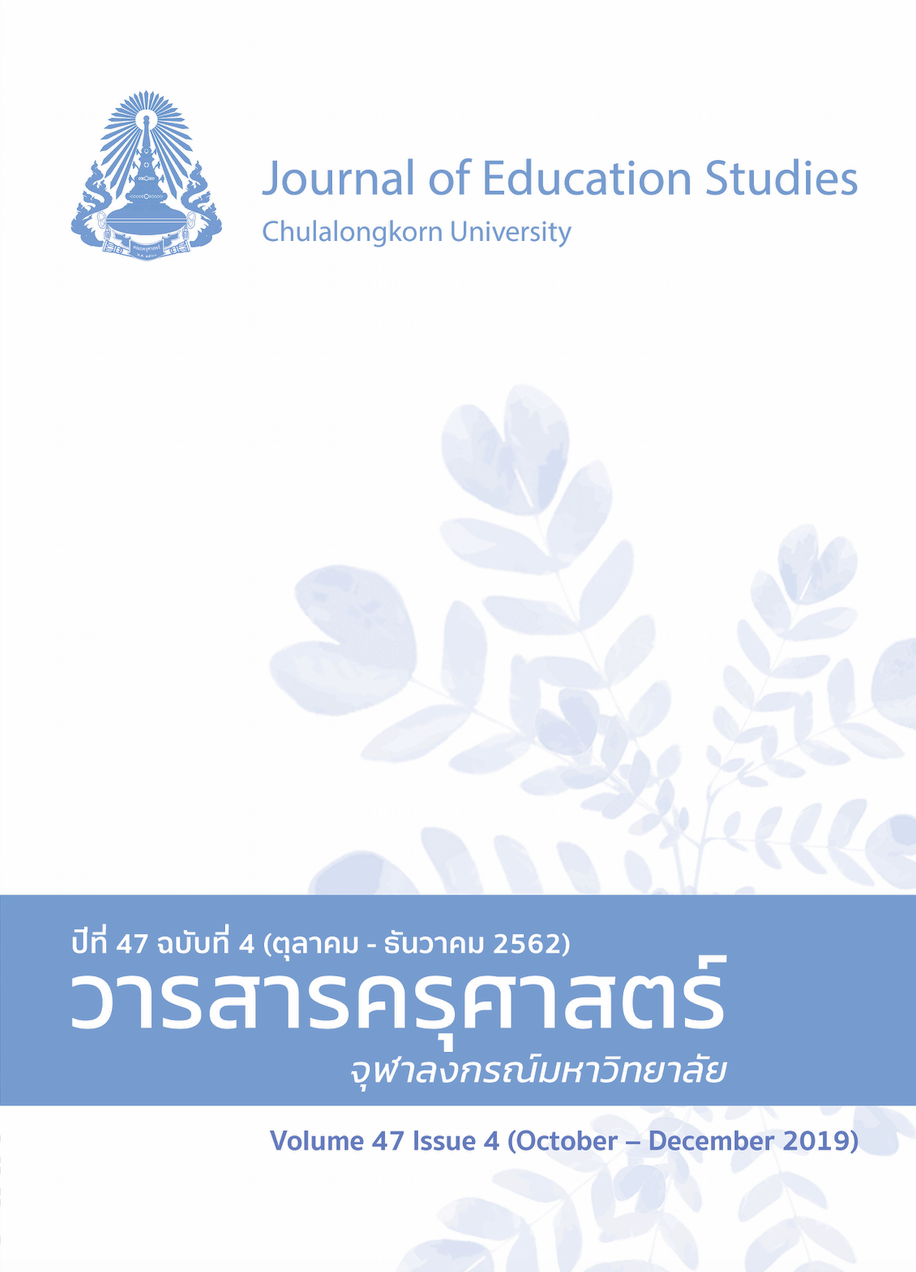An Analysis of Essential Life Skills to Enhance Social Inclusion Education of Underprivileged Children
Keywords:
LIFE SKILLS, UNDERPRIVILEGED CHILDREN, SOCIAL INCLUSIONAbstract
The objectives of this study are to analyze the needs assessment of underprivileged children’s essential life skills for social inclusion and to categorize the essential life skills for the underprivileged children needed to enhance social inclusion education. The data collection is comprised of a survey questionnaire, which was administered to two groups of the underprivileged and normal children and their teachers living in the risky urban area, 2,046 participants in total, and an in-depth interview which was designed for thirteen of administrators, academics, parents and successful underprivileged children.
The result suggested that the underprivileged children were accepted as social inclusion at the moderate level, lower than those of the normal ones; however, they both have the somewhat moderate level of essential life skills without any statistically significant differences among the groups. Generally, the normal children were expected to have higher level of these skills with significant differences at .05 level. The frequently mentioned skills include: critical thinking, creative thinking, problem-solving, effective communication, decision-making, self-awareness, coping with emotion, and interpersonal relationship.
References
กมลินทร์ พินิจภูวดล. (2541). การศึกษาของเด็กด้อยโอกาส. กรุงเทพมหานคร: สำนักงานคณะกรรมการการศึกษาแห่งชาติ.
ถวิลวดี บุรีกุล. (2553). คุณภาพสังคมในประเทศไทย. สืบค้นจาก http://www.hiso.or.th/hisosocial/activities/filedoc/%E0%B8%94%E0%B8%A3%%E0%B8%B2%E0%B8%9E.pdf
ประทานพร ศรีอนันต์ และ อุบลวรรณ หงษ์วิทยากร. (2556). การนำเสนอแนวทางพัฒนาทักษะชีวิตของเยาวชนในกรุงเทพมหานคร. สืบค้นจาก http://www.edu.chula.ac.th/ojed/doc/V81/v81d0096.pdf
ปรัชญา เวสารัชช์. (2545). หลักการจัดการศึกษา. กรุงเทพมหานคร: สำนักงานปฏิรูปการศึกษา.
พิณสุดา สิริธรังศรี. (2552). ภาพการศึกษาไทยในอนาคต 10-20 ปี. กรุงเทพมหานคร: พิมพ์ดีการพิมพ์.
วิทยากร เชียงกูล. (2552). สภาวะการศึกษาไทยปี 2550/2551 ปัญหาความเสมอภาคและคุณภาพของการศึกษาไทย. กรุงเทพมหานคร: วี.ที.ซี. คอมมิวนิเคชั่น.
ศรเนตร อารีโสภณพิเชษฐ์. (2557). กลยุทธ์การเรียนการสอนเพื่อพัฒนาทักษะการคิดวิเคราะห์: แผนที่มโนทัศน์. วารสารครุศาสตร์, 42(3), 194–210.
ศรีศักดิ์ ไทยอารี, ณฐกร ศรีแก้ว, และ กานต์ เสริมชัยวงศ์. (2546). สถานภาพการให้บริการการศึกษาสำหรับเด็กด้อยโอกาสในต่างประเทศ: สหรัฐอเมริกา สหราชอาณาจักร บราซิล ฟิลิปปินส์ และออสเตรเลีย. กรุงเทพมหานคร: องค์การค้าของคุรุสภา.
สำนักงานคณะกรรมการการศึกษาขั้นพื้นฐาน. (2554). แนวทางการพัฒนาทักษะชีวิตบูรณาการ 8 กลุ่มสาระการเรียนรู้ หลักสูตรแกนกลางการศึกษาขั้นพื้นฐาน พุทธศักราช 2551. กรุงเทพมหานคร: ชุมนุมสหกรณ์.
สำนักงานคณะกรรมการการศึกษาขั้นพื้นฐาน. (2557). สารสนเทศสำนักงานคณะกรรมการการศึกษาขั้นพื้นฐาน. สืบค้นจาก http://www.bopp-obec.info/home/?page_id=5993
สุภางค์ จันทวานิช. (2556). วิธีการวิจัยเชิงคุณภาพ. กรุงเทพมหานคร: สำนักพิมพ์แห่งจุฬาลงกรณ์มหาวิทยาลัย.
สุรสิทธิ์ วชิรขจร. (2553). คุณภาพสังคม: จากยุโรปสู่ประเทศไทย. สืบค้นจากwww.km.nida.ac.th/home/images/pdf/11a.pdf
สุวิมล ว่องวาณิช. (2548). การวิจัยประเมินความต้องการจำเป็น. กรุงเทพมหานคร: สำนักพิมพ์แห่งจุฬาลงกรณ์มหาวิทยาลัย.
ภาษาอังกฤษ
Abbott, P., & Wallace, C. (2011). Social quality: A way to measure the quality of society. Retrieved from http://link.springer.com/article/10.1007%2Fs 11205-011-9871-0
Beck, W., Van Der Maesen, L. J. G., & Walker, A. (1997). The social quality of Europe. Alphen aan den Rijn: Kluwer Law International.
Beck, W., Van Der Maesen, L. J. G., & Walker, A. (1998). The social quality of Europe. Bristol: Policy Press.
Beck, W., Van Der Maesen, L. J. G., & Walker, A. (2001). Theorizing social quality: The concept’s validity. In W. Beck, L. J. G. Van Der Maesen., F. Thomse, & A. Walker (Eds.), Social quality: A vision for Europe (pp. 307-360). Alphen aan den Rijn: Kluwer Law International.
Department of State. (2014). Trafficking in persons report, June 2014. Washington, D.C.: U.S. Department of State Publication.
Krejcie, R. V., & Morgan, D. W. (1970). Determining sample size for research activities. Educational and Psychological Measurement, 30, 607–610.
Lin, K., Ward, P., & Van Der Measen, L. J. G. (2009). Social quality theory in perspective. Development and Society, 38(2), 201–208.
The United Nations Children's Fund [UNICEF]. (2001). Life skills. Retrieved from http://www.unicef.org/lifeskills/index.html
World Health Organization [WHO]. (1997). Life skills education for children and adolescent in school: Introduction and guidelines to facilitate the development and implementation of life skills programs. Geneva: Programme on Mental Health World Health Organization.




